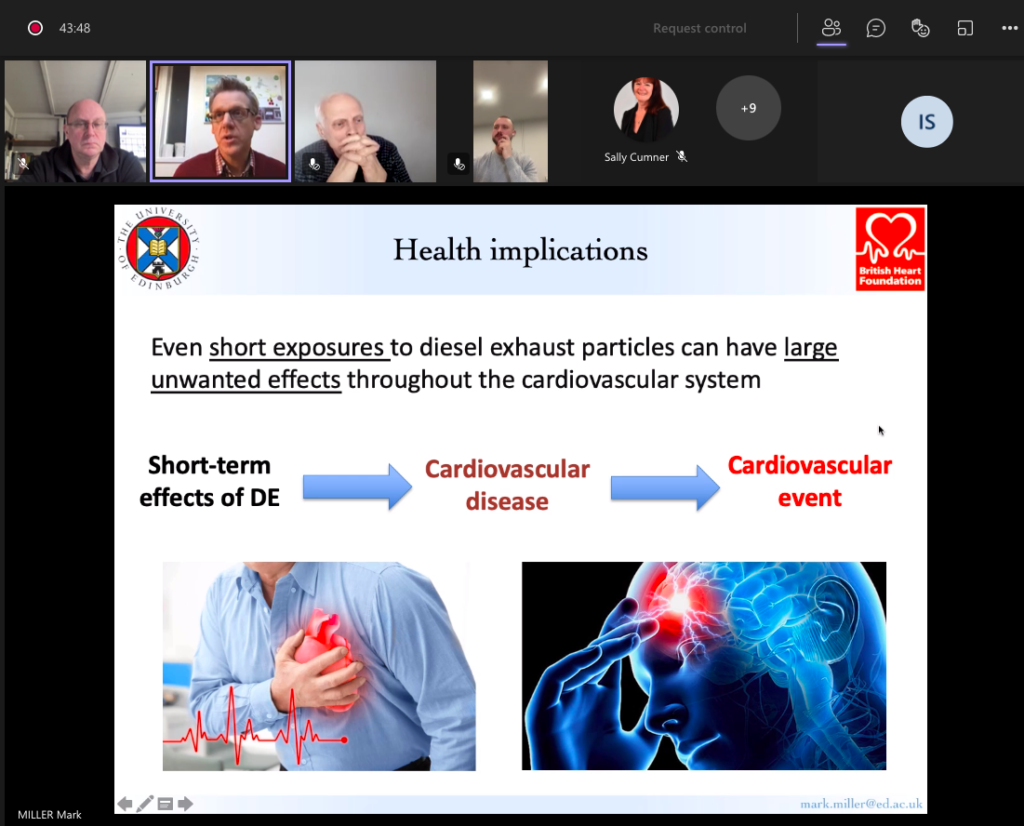Dr Mark Miller, Senior Research Scientist, The University of Edinburgh, highlighted the impacts ultrafine particles have on cardiovascular systems at the WCRAQ Air Health working part on 23 November 2021.
Jason Airey, MD, CMS SupaTrak, gave an update on the ongoing work the Commission is undertaking and outlined the main objectives – educating parliament, introducing sustainability to the national curriculum, and changing legislation with quick wins, such as the Diesel Particulate Filter (DPF) bill – introducing stricter DPF testing in annual Ministry of Transport (MOT) tests. Jason mentioned the Policy Working Party had recently been set up. Peers for the Planet and MPs are keen to be involved and to start more conversations in the House of Lords and Parliament.
Professor Sir Stephen Holgate CBE, Clinical Professor, University of Southampton, chaired the Air Health working party meeting.
Ultrafine particles
Dr. Mark Miller specialises in investigating how air pollution harms the cardiovascular system, in particular, how ultrafine particles in vehicle exhausts can gain access to the circulation and the biological mechanisms by which they cause damage.
Air pollution affects everyone
Mark began by highlighting why we should worry about air pollution. ‘It affects everyone – not just the vulnerable,’ he commented. Mark highlighted that there is no safe level of air pollution and that air pollution has health impacts on all organs of the body, not just the lungs and cardiovascular system.
The Committee on the medical effects of air pollution (COMEAP) estimated that the two major pollutants, PM2.5 (particulate matter with a diameter of less than 2.5 micrometres) and nitrogen dioxide (NO2), are responsible for over 30,000 early deaths in the UK every year, and air pollution, in general, is responsible for up to 9 million early deaths a year worldwide.
Health impact of air pollution
Mark went on to discuss the connection between air pollution and health, specifically cardiovascular disease. Mark outlined how diesel exhaust fumes are specifically rich in ultrafine particles (PM2.5) and that these particles can have many adverse effects on the heart, blood and blood vessels.
Gold particle study
He explained how particle size plays a critical role in how particles enter the body. Investigating particle translocation (particles travelling from the air into the blood) is challenging because of the tiny size of particles and the difficulty of detecting it in blood. To get around this, he used gold ultrafine particles to replicate exposure to diesel exhaust pollution. Volunteers inhaled gold ultrafine particles in order that the gold could be measured in the blood, and found particles still in the blood three months after the experiment was carried out.
Mark concluded by explaining how even short exposures to diesel exhaust particles can have substantial unwanted effects throughout the cardiovascular system. These short-term effects may then lead to the development of cardiovascular disease and possibly increase the chances of cardiovascular events such as having a heart attack or stroke.
NO2 vs particulate matter
Ralph Wilce, the Chair for the Air Monitoring Working Party, commented on how Mark’s research supports the work at the Commission, including MOT checking DPF filters and increasing awareness with the DPF bill. He went on to ask: ‘Why is the Government focusing on NO2 rather than particulate matter?’
Mark explained that NO2 is more easily measured than PM, and that there are regular exceedances in NO2 that can be used to show that current air pollution policies are not strong enough. However, ‘NO2 and PM often come from the same source in urban locations, so a key strategy should be to remove and reduce the cause – replacing diesel and petrol vehicles will be a key focus to limit the health effects of air pollution.’
Become a member
If you would like to make a difference to the quality of the air we breathe, become a member by contacting us today at [email protected].




